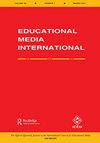Teacher perspectives of self-efficacy and remote learning due to the emergency school closings of 2020
IF 1.4
Q2 EDUCATION & EDUCATIONAL RESEARCH
引用次数: 8
Abstract
ABSTRACT The K-12 Spring 2020 COVID-19 school closures saw teachers move into an online learning environment, and use their knowledge of technology, pedagogy, and content (TPACK) to develop online learning for the remainder of the school year. The purpose of this study was to examine the relationship between teachers’ self-efficacy as measured by TPACK and their perceived success and satisfaction for delivering online learning during the emergency COVID-19 school closures. A web-based survey was conducted of in-service K-12 teachers instructing remotely. While teachers felt competent in technology integration and felt successful with the remote instruction in Spring 2020, teachers were not always satisfied with their online experience. Furthermore, content area proved to be a factor in predicting both success and satisfaction with online instruction. Teachers with a stronger understanding of their content area and instructional strategies related to the content did not feel their students were successful nor did they feel satisfied with their work online. Results from this study suggests additional support is needed for teachers to bring their teaching to an online platform. School districts should invest in the support and resources needed to provide teachers with professional development specific to grade level and content.2020年学校紧急关闭对教师自我效能感和远程学习的影响
2020年春季K-12学校因COVID-19而停课,教师们进入了在线学习环境,并利用他们在技术、教学法和内容(TPACK)方面的知识来开发本学年剩余时间的在线学习。本研究的目的是研究TPACK测量的教师自我效能感与他们在COVID-19紧急学校关闭期间提供在线学习的感知成功和满意度之间的关系。对远程教学的在职K-12教师进行了一项基于网络的调查。尽管教师们在2020年春季的远程教学中感到自己在技术整合方面很有能力,也很成功,但教师们并不总是对自己的在线体验感到满意。此外,内容区域被证明是预测在线教学成功和满意度的一个因素。对教学内容领域和相关教学策略有更深入了解的教师并不认为他们的学生是成功的,也不满意他们的在线作业。这项研究的结果表明,教师需要额外的支持才能将他们的教学带到在线平台上。学区应该投资所需的支持和资源,为教师提供针对年级水平和内容的专业发展。
本文章由计算机程序翻译,如有差异,请以英文原文为准。
求助全文
约1分钟内获得全文
求助全文
来源期刊

Educational Media International
EDUCATION & EDUCATIONAL RESEARCH-
CiteScore
3.20
自引率
0.00%
发文量
10
 求助内容:
求助内容: 应助结果提醒方式:
应助结果提醒方式:


